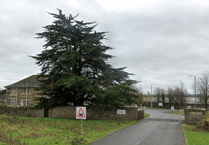An academic has urged the Senedd to introduce a sin bin-style approach to sanctioning misbehaving members.
Jonathan Tonge, a professor at the University of Liverpool, gave evidence to a Senedd inquiry on creating a recall system to allow voters to remove members between elections.
Prof Tonge raised concerns about a suspension of 10 sitting days or more being used as one of the criteria for triggering a petition under Westminster’s recall system.
He told the standards committee the “blunt, arbitrary” cutoff creates a cliffedge as he called for a “tapered, sin bin” approach with different sanctions for 10 to 30-day suspensions.
Prof Tonge contrasted relatively light sanctions, such as the removal of rights and privileges, below 10 days with a “drastic and draconian” penalty above the threshold.
‘Anti-democratic’
The politics professor warned it is “very, very difficult for the miscreant to ‘survive’”, pointing out that only one MP has remained in post following a recall petition.
Vikki Howells, who chairs the committee, asked whether Senedd members who change their political allegiance after an election should be subject to recall.
From 2016 to 2021, more than 10 per cent of members jumped ship at least once – with Mark Reckless representing Ukip, the Tories, Brexit Party and Abolish the Welsh Assembly.
Prof Tonge said defecting should be grounds for recall, particularly under the closed-list electoral system which will see people voting for parties rather than candidates from 2026.
He told the committee: “If you’ve got a party list system and someone’s stood on a party label then switches, the electorate may struggle to understand the legitimacy of that.
“It is in many ways anti-democratic.”
‘Wrongdoing’
Asked by Plaid Cymru’s Peredur Owen Griffiths how a Senedd recall system could work, Prof Tonge said a straightforward option would be to co-opt a replacement from party lists.
He said holding by-elections risks punishing parties for the wrongdoing of individuals.
But he warned it would be more of a removal petition than a recall one because MSs would not be able to fight a by-election to clear their name as in Westminster.
Prof Tonge told committee members he is “not a massive fan of co-option”, stressing it is possible to hold by-elections under a proportional representation system.
The expert raised the example of Ireland holding 138 by-elections since 1923, with seats changing hands in almost half of those instances.
‘Insurmountable’
He made a case for raising the threshold of 10 per cent of voters signing a petition to 15 per cent, if replacements are co-opted under Wales’ new fully proportional system.
Mark Drakeford suggested a simple retain-or-replace ballot, with a 20 per cent threshold to ensure a reasonable proportion of the electorate takes part.
Prof Tonge was wary about raising the threshold too high, warning it might be a struggle to get 20 per cent of the electorate to turn out.
“I wouldn't start making the threshold insurmountable,” said the academic.
He pointed out that 18.9 per cent signed a petition which triggered a UK Parliament by-election in Brecon and Radnorshire in 2019 after an MP was convicted of claiming false expenses.
‘Hamstrung’
Asked by the former first minister about spending limits, Prof Tonge said a £10,000 cap on expenditure by campaigners seems reasonable.
He told Prof Drakeford spending on recall petitions has been modest because campaigners are rightly not allowed to provide running commentary.
He said: “Parties have found themselves fairly hamstrung in what they can do any way and that might explain why they have, thus far, not spent a lot of money campaigning.”
Prof Tonge added that parties know the 10% threshold will likely be reached.
He explained that the threshold has been comfortably passed ever since the 2018 North Antrim petition, which was exceptional due to the particular politics of Northern Ireland.
‘Great opportunity’
Prof Tonge described the ad-hoc number of petition stations, for people to sign in person, as a flaw in Westminster’s model, which can be correlated with turnout.
He cautioned that recall petitions can be costly, with the most expensive costing £500,000, but he said: “It’s a balance – you don’t want to cost cut on democracy.”
Asked by the Conservatives’ Natasha Asghar for examples of best practice, he stressed that no institution has got recall 100% right and there will always be anomalies.
But Prof Tonge told the committee meeting on 10 June: “It’s not often that these words might cross my lips but I actually think Westminster has got this broadly right.”
He added: “I do think you’ve got a great opportunity here … to correct the details that Westminster got wrong while retaining the 80 per cent-plus that Westminster got right.”





Comments
This article has no comments yet. Be the first to leave a comment.